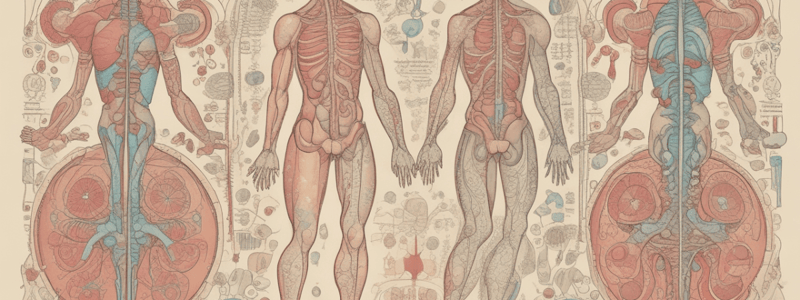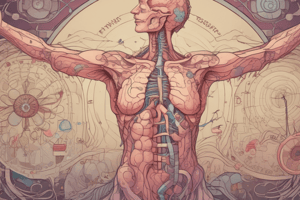Podcast
Questions and Answers
What is the primary function of the endocrine system?
What is the primary function of the endocrine system?
- To filter waste and excess fluids from the blood
- To produce and secrete hormones for the immune system
- To regulate the body's movement and coordination
- To control the body's internal environment and maintain homeostasis (correct)
What are the three main categories of hormones?
What are the three main categories of hormones?
- Vitamins, minerals, and electrolytes
- Proteins and polypeptides, steroid hormones, and tyrosine derivatives (correct)
- Proteins, carbohydrates, and lipids
- Enzymes, acids, and bases
What is the function of steroid hormones?
What is the function of steroid hormones?
- To pass through cell membranes and elicit a response (correct)
- To produce a response at the cell that produces them
- To travel long distances to reach their target cells
- To stimulate other endocrine glands to produce hormones
What is the autocrine function of hormones?
What is the autocrine function of hormones?
What is the primary function of the hypothalamus?
What is the primary function of the hypothalamus?
What is the primary function of the parathyroid gland?
What is the primary function of the parathyroid gland?
What is the primary function of the adrenal glands?
What is the primary function of the adrenal glands?
Which gland is often referred to as the 'master gland'?
Which gland is often referred to as the 'master gland'?
Which of the following glands produces hormones in response to stress?
Which of the following glands produces hormones in response to stress?
What is the main function of hormones with an endocrine function?
What is the main function of hormones with an endocrine function?
Which of the following hormones are derived from the amino acid tyrosine?
Which of the following hormones are derived from the amino acid tyrosine?
What is the function of the thyroid gland?
What is the function of the thyroid gland?
Which of the following glands is a member of both the nervous and endocrine systems?
Which of the following glands is a member of both the nervous and endocrine systems?
What is the main function of protein and polypeptide hormones?
What is the main function of protein and polypeptide hormones?
Which of the following glands produces sex hormones?
Which of the following glands produces sex hormones?
Which of the following statements is true about the endocrine system?
Which of the following statements is true about the endocrine system?
What is unique about steroid hormones in terms of their structure?
What is unique about steroid hormones in terms of their structure?
Which of the following glands has a direct impact on multiple other endocrine glands?
Which of the following glands has a direct impact on multiple other endocrine glands?
What is the primary difference between paracrine and autocrine functions of hormones?
What is the primary difference between paracrine and autocrine functions of hormones?
Which of the following hormones is NOT produced by the adrenal glands?
Which of the following hormones is NOT produced by the adrenal glands?
What is the main function of the hypothalamus in relation to the endocrine system?
What is the main function of the hypothalamus in relation to the endocrine system?
Which of the following hormones is an example of a tyrosine derivative?
Which of the following hormones is an example of a tyrosine derivative?
What is the main function of hormones with an endocrine function?
What is the main function of hormones with an endocrine function?
What is the primary function of the gonads in the endocrine system?
What is the primary function of the gonads in the endocrine system?
Flashcards are hidden until you start studying
Study Notes
The Endocrine System
- The endocrine system is a network of glands that produce and secrete hormones, which are chemical messages that travel through the bloodstream to reach their target cells, tissues, or organs.
- The endocrine system works together with the nervous system to control the body's internal environment and maintain homeostasis.
Hormones
- Hormones are classified into three main categories: proteins and polypeptides, steroid hormones, and tyrosine derivatives.
- Proteins and polypeptides are made up of amino acids and can range from 3 to hundreds of amino acids in length.
- Steroid hormones are derived from cholesterol and are lipid-like, allowing them to pass through cell membranes.
- Tyrosine derivatives are hormones derived from the amino acid tyrosine, including thyroid hormones and catecholamines.
Function of Hormones
- Autocrine function: hormones that elicit a response at the cell that produces them or the cell immediately next to it.
- Paracrine function: hormones that have a regional effect, often acting on nearby cells or tissues.
- Endocrine function: hormones that travel long distances to reach their target cells, tissues, or organs.
Organs of the Endocrine System
- Hypothalamus: a member of both the nervous and endocrine systems, responsible for regulating body temperature, hunger, and thirst, and controlling the pituitary gland.
- Pituitary gland: often referred to as the "master gland", stimulates other endocrine glands to produce hormones.
- Thyroid gland: regulates metabolism, producing thyroid hormones T3 and T4.
- Parathyroid gland: regulates calcium levels in the body, producing parathyroid hormone.
- Adrenal glands: produce hormones in response to stress, including glucocorticoids and mineralocorticoids from the cortex, and catecholamines from the medulla.
- Gonads: produce sex hormones, including estrogen and progesterone in females, and testosterone in males.
- Pancreas: produces hormones insulin and glucagon to regulate blood sugar levels.
Additional Facts
- The endocrine system is slower than the nervous system, with effects taking minutes to days or weeks to manifest.
- Hormones can be classified by structure and function.
- The hypothalamus and pituitary gland are closely linked, with the hypothalamus controlling the pituitary gland's release of hormones.
The Endocrine System
- The endocrine system is a network of glands that produce and secrete hormones, which are chemical messages that travel through the bloodstream to reach their target cells, tissues, or organs.
- The endocrine system works together with the nervous system to control the body's internal environment and maintain homeostasis.
Hormones
- Three main categories of hormones: proteins and polypeptides, steroid hormones, and tyrosine derivatives.
- Proteins and polypeptides are made up of amino acids and can range from 3 to hundreds of amino acids in length.
- Steroid hormones are derived from cholesterol and are lipid-like, allowing them to pass through cell membranes.
- Tyrosine derivatives are hormones derived from the amino acid tyrosine, including thyroid hormones and catecholamines.
Function of Hormones
- Autocrine function: hormones that elicit a response at the cell that produces them or the cell immediately next to it.
- Paracrine function: hormones that have a regional effect, often acting on nearby cells or tissues.
- Endocrine function: hormones that travel long distances to reach their target cells, tissues, or organs.
Organs of the Endocrine System
- Hypothalamus: regulates body temperature, hunger, and thirst, and controls the pituitary gland.
- Pituitary gland: stimulates other endocrine glands to produce hormones.
- Thyroid gland: regulates metabolism, producing thyroid hormones T3 and T4.
- Parathyroid gland: regulates calcium levels in the body, producing parathyroid hormone.
- Adrenal glands: produce hormones in response to stress, including glucocorticoids and mineralocorticoids from the cortex, and catecholamines from the medulla.
- Gonads: produce sex hormones, including estrogen and progesterone in females, and testosterone in males.
- Pancreas: produces hormones insulin and glucagon to regulate blood sugar levels.
Additional Facts
- The endocrine system is slower than the nervous system, with effects taking minutes to days or weeks to manifest.
- Hormones can be classified by structure and function.
- The hypothalamus and pituitary gland are closely linked, with the hypothalamus controlling the pituitary gland's release of hormones.
The Endocrine System
- The endocrine system is a network of glands that produce and secrete hormones, which are chemical messages that travel through the bloodstream to reach their target cells, tissues, or organs.
- The endocrine system works together with the nervous system to control the body's internal environment and maintain homeostasis.
Hormones
- Three main categories of hormones: proteins and polypeptides, steroid hormones, and tyrosine derivatives.
- Proteins and polypeptides are made up of amino acids and can range from 3 to hundreds of amino acids in length.
- Steroid hormones are derived from cholesterol and are lipid-like, allowing them to pass through cell membranes.
- Tyrosine derivatives are hormones derived from the amino acid tyrosine, including thyroid hormones and catecholamines.
Function of Hormones
- Autocrine function: hormones that elicit a response at the cell that produces them or the cell immediately next to it.
- Paracrine function: hormones that have a regional effect, often acting on nearby cells or tissues.
- Endocrine function: hormones that travel long distances to reach their target cells, tissues, or organs.
Organs of the Endocrine System
- Hypothalamus: regulates body temperature, hunger, and thirst, and controls the pituitary gland.
- Pituitary gland: stimulates other endocrine glands to produce hormones.
- Thyroid gland: regulates metabolism, producing thyroid hormones T3 and T4.
- Parathyroid gland: regulates calcium levels in the body, producing parathyroid hormone.
- Adrenal glands: produce hormones in response to stress, including glucocorticoids and mineralocorticoids from the cortex, and catecholamines from the medulla.
- Gonads: produce sex hormones, including estrogen and progesterone in females, and testosterone in males.
- Pancreas: produces hormones insulin and glucagon to regulate blood sugar levels.
Additional Facts
- The endocrine system is slower than the nervous system, with effects taking minutes to days or weeks to manifest.
- Hormones can be classified by structure and function.
- The hypothalamus and pituitary gland are closely linked, with the hypothalamus controlling the pituitary gland's release of hormones.
The Endocrine System
- The endocrine system is a network of glands that produce and secrete hormones, which are chemical messages that travel through the bloodstream to reach their target cells, tissues, or organs.
- The endocrine system works together with the nervous system to control the body's internal environment and maintain homeostasis.
Hormones
- Three main categories of hormones: proteins and polypeptides, steroid hormones, and tyrosine derivatives.
- Proteins and polypeptides are made up of amino acids and can range from 3 to hundreds of amino acids in length.
- Steroid hormones are derived from cholesterol and are lipid-like, allowing them to pass through cell membranes.
- Tyrosine derivatives are hormones derived from the amino acid tyrosine, including thyroid hormones and catecholamines.
Function of Hormones
- Autocrine function: hormones that elicit a response at the cell that produces them or the cell immediately next to it.
- Paracrine function: hormones that have a regional effect, often acting on nearby cells or tissues.
- Endocrine function: hormones that travel long distances to reach their target cells, tissues, or organs.
Organs of the Endocrine System
- Hypothalamus: regulates body temperature, hunger, and thirst, and controls the pituitary gland.
- Pituitary gland: stimulates other endocrine glands to produce hormones.
- Thyroid gland: regulates metabolism, producing thyroid hormones T3 and T4.
- Parathyroid gland: regulates calcium levels in the body, producing parathyroid hormone.
- Adrenal glands: produce hormones in response to stress, including glucocorticoids and mineralocorticoids from the cortex, and catecholamines from the medulla.
- Gonads: produce sex hormones, including estrogen and progesterone in females, and testosterone in males.
- Pancreas: produces hormones insulin and glucagon to regulate blood sugar levels.
Additional Facts
- The endocrine system is slower than the nervous system, with effects taking minutes to days or weeks to manifest.
- Hormones can be classified by structure and function.
- The hypothalamus and pituitary gland are closely linked, with the hypothalamus controlling the pituitary gland's release of hormones.
Studying That Suits You
Use AI to generate personalized quizzes and flashcards to suit your learning preferences.




